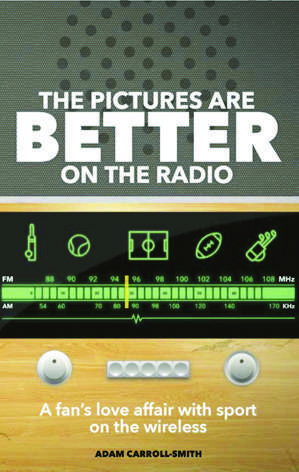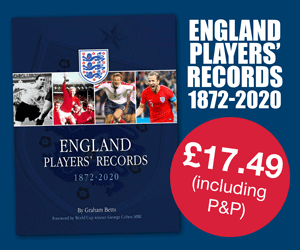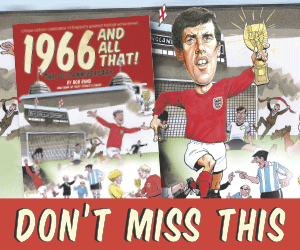 Adam Carrol-Smith gives us a taster of his new book, The Pictures Are Better on the Radio: A fan’s love affair with sport on the wireless, published by Pitch Publishing…
Adam Carrol-Smith gives us a taster of his new book, The Pictures Are Better on the Radio: A fan’s love affair with sport on the wireless, published by Pitch Publishing…
My first radio was a Sony Walkman. I got it around my ninth, maybe tenth, birthday. It was shiny and black with a mess of small buttons on the front, like Darth Vader’s chest panel, only with better AM/FM reception than he probably got.
Along the left-hand side were a series of tiny switches, and on the back, a belt clip. I actually used the belt clip a lot. I thought it made me look cool. And still do, as it goes, because it did.
Belt clip aside, I loved my Walkman because of its ability to defy my puritanical bedtime. Back then, lights out for my brother and I came at seven o’clock; half-past on a good night. And not because we lived on an 18th-century working farm and there was milking to do early next morning either.
As far as I could tell, there was no reason, besides my parents’ selfishness. Now that I have children of my own, I get it: children are tiring, and parents need some quality time alone to tidy up toys, eat in silence, and watch a TV programme with a murder in it.
Growing up, I was lucky enough to have one of those combi TV-and-video sets in my room, and my first instinct was to try and watch that once my mum and dad were safely deposited back downstairs. But switching it on was a noisy operation. The power button made a loud plastic clang when you pushed it in, and an even louder one when you released it. If there was a tape in the machine – and there always was – it made a pained whirring noise; a sort of winding heave like the sound an old robot with a bad back would make if he was trying to lift his robot grandchild, and the robot grandchild was just far too heavy and his lifting technique was all wrong.
All that racket was enough, nine times out of ten, to give away my covert intentions.
On the tenth time, the best I could do was watch with the sound off.
My desire for a Walkman was borne of necessity, in the first instance. And fortunately for me, my parents are wonderful and generous and kind people so they indulged me, and bought me one.
Snug beneath my duvet, I would pull my radio and spongy headphones out from under my pillow and listen in the dark, the only light in the room coming from the small red battery indicator LED on the front of the radio. My favourite thing to listen to was football, principally because I knew my mum and dad would be watching on TV downstairs. I liked that I was defying my bedtime instructions, and enjoying the same entertainment they were, without them even knowing.
I liked the sound of a commentator talking close into a lip mic. I liked the noise a crowd made: the small pockets of singing that marked a quiet passage of play; the full-throated roar that accompanied a goal; the howling fury that followed a late challenge or flag. I liked that it was the supporters, not the players, who led the action: without the context provided by TV’s wide-angle pitch view, cheers and jeers were exciting events in themselves. They arrived suddenly and without context. The crowd created the drama, they propelled the action along, and the commentators provided the detail a split-second later.
I liked listening to those night games best, in winter. It was strangely enjoyable to hear of whipping winds and horizontal rain at Villa Park or Elland Road while I lay toasty and secure in bed. I felt the cold in the stadium, and was glad to be elsewhere.
It heightened my sense of excitement that the commentary was always so busy and urgent, while I was horizontal; that while the match was all noise and light and colour, my bedroom (to a passing parent at least) was quiet, dark and still.
Most of all, I liked the fact that listening to a match on the radio, alone in my bed, it was possible to feel intimately involved and incredibly close to the action – to really picture what was happening – despite being in my pyjamas, in the dark, hundreds of miles away. It was the first time I realised that radio sport, at its best, is teleportation.
I don’t remember individual games, because most of the time, the teams playing were unimportant: it was entertainment enough to remove myself to the secret world of adventure that Five Live – and it was always Five Live – opened up. My interest in football as a pre-teen boy was so total that I was content to have any contact with it whatsoever. I would have listened to non-league football through the fuzziest of receptions if it meant staying up later, and being able to imagine two teams in direct competition.
These, then, were the formative moments in what is now a lengthy relationship. And it is unquestionably relevant that what I can recall now, so many years later, is how it made me feel. I was, I think, quite an attentive listener back then: I was hungry for fact and detail and trivia.
I needed playground ammunition – knowledge about players and teams I could drop into conversation with my equally football-obsessed friends. But nothing of the sort stands out. I cannot remember, even vaguely, a defining moment of commentary that electrified me in my bed and had me kicking the sheets in excitement. And yet it does not seem to matter in the least. Listening to radio football stimulated the creation of vivid images in my head and that, in itself, was addictive.
Looking back, my parents must have known. Some nights I fell asleep with both the radio and my headphones still on. And yet they never once picked me up on it. I guess they probably thought my late-night radio activities to be quite a harmless sort of rebellion against their authority. I imagine they reckoned against it being the sort of thing which could snowball into a worrying obsession. On reflection, I think they misjudged it

















